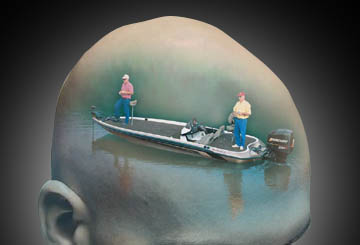Putting it all together: A real-life story
Performance psychology paves way to Ranger Owners win, Forrest Wood Cup for Missouri angler

Isn’t it just a great feeling when it all comes together? Smooth as can be, all your preparation, lure selection and presentation skills work in concert, and you wind up catching them just like you planned. The feeling of satisfaction, the sense of accomplishment, the joy and excitement are indescribable, really. In this article I’m going to tell you about one of those days.
Recently I received a call from a competitive angler I coach. In an excited voice, he told me how he had used several of the performance-psychology principles we had been working on together to do well in a major tournament.
“It all started with my fishing log,” he exclaimed. A tournament was being held on a lake where he had kept extensive records for some time. In reviewing his fishing log, he noticed how a previous competition had been won in a specific section of the lake under conditions that seemed exactly aligned with those for the coming tournament. The tournament date, the weather conditions, the lake level and even the moon phase were identical to those of a previous event. “I couldn’t have been more confident in the section of the lake we planned to fish,” the angler told me. “Of course, we would still have to catch them, but I knew where they would be.”
Tournament day came, and the predawn air was calm – and very foggy. The “ease-off” was delayed because of poor visibility. “Since I was very confident of where we were going and what we would be doing, I was able to kick back; and as I did, I began to notice the anglers around me,” he reported. “It was amazing, really! What I saw in boat after boat was competitive anglers doing what I used to do; there were lots of guys nervously wringing their hands, looking uptight and fretting about weather conditions over which they had no control. I couldn’t tell for sure if their confidence was eroding the way mine used to, but from a mental standpoint, I felt our chances were getting better the longer the delay lasted!
“The marina finally cleared, and we eased off,” he said, “but when we turned the corner to head up the river we wanted to fish, the fog was socked in like you wouldn’t believe. Historically, I would’ve been intimidated, and I probably would have turned around and run to some second or third option, but this time, because I was confident, we pressed on. I held the GPS, and I told my partner to watch for boats and debris; at half-throttle we made it to our spot.
“Quickly we caught a fish and then lost another; `They are here,’ I told my partner. The football jigs that usually work in this stretch, however, were not that productive, so we switched to shaky heads to fill our limit. Once again, even though the action was slow, I was so confident of the area that I knew we needed to switch lures and techniques rather than locations.
“Still, the size of the fish we were catching was much less than what I expected, and with less than an hour to go in the tournament, we only had about 11 pounds. We had to decide whether to hold our area and use even greater concentration or pull up and make a desperation run to one last spot. Previously, I would’ve felt nervous and we would’ve run. This time I was convinced we had made the best choice, and we were going to play this all the way out. In the next 45 minutes, we nearly doubled our weight, and we ended up winning by nearly 2 pounds.
“Really, we won because of the mental and psychological variables I learned from you: good recordkeeping, unwavering confidence, versatility and adjusting the right variables (presentation). Thanks, Doc!” he said as he hung up.
If you think you may have heard this story recently, it’s because you probably did. The angler’s name is Aaron Martin. He and his partner just won the 277-boat Ranger  Owners Tournament Championship Series event on Table Rock Lake in Missouri. If you are not entirely sure about whether or how performance-psychology techniques might improve your fishing, feel free to contact Aaron. He’ll be happy to repeat his story to you!
Owners Tournament Championship Series event on Table Rock Lake in Missouri. If you are not entirely sure about whether or how performance-psychology techniques might improve your fishing, feel free to contact Aaron. He’ll be happy to repeat his story to you!
————————————————–
Dr. Fish, also known as Jay T. McNamara, Ph.D., L.P., also known as Dr. Fish, has just finished his book, “The Psychology of Exceptional Fishing.” You can order it by contacting Jay via e-mail at this address: [email protected].
————————————————–
Jay T. McNamara, Ph.D., L.P., is a psychologist, who is also an avid bass and walleye angler. With more than 26 years of professional experience complemented by participation in competitive fishing at local and national levels, he is uniquely qualified to illustrate how performance psychology principles apply to tournament fishing.